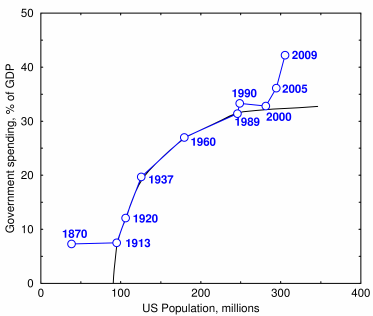political commentary
Is Democracy Still Viable?
 ow that everyone in the country has finished autopsying the 2012 elections, we can
see that nothing fundamental has changed. The voters voted along sad but predictable
lines: government workers (which includes almost everyone at our universities)
voted to increase the size of government. Welfare recipients and the rest of the
infamous 47% voted to increase the amount the government gives them at the
expense of everyone else. Like a Toyota with a stuck gas pedal, it appears
that government spending will continue to increase at an ever-accelerating pace
until it crashes in a giant ball of fire.
ow that everyone in the country has finished autopsying the 2012 elections, we can
see that nothing fundamental has changed. The voters voted along sad but predictable
lines: government workers (which includes almost everyone at our universities)
voted to increase the size of government. Welfare recipients and the rest of the
infamous 47% voted to increase the amount the government gives them at the
expense of everyone else. Like a Toyota with a stuck gas pedal, it appears
that government spending will continue to increase at an ever-accelerating pace
until it crashes in a giant ball of fire.

Government Spending vs. Population
The graph at right shows that until recently, government spending as a percentage of GDP had followed an almost perfect hyperbolic curve since 1913, when the government changed the U.S. Constitution to allow itself to collect income taxes. This curve could be rationalized by supposing that the increasing urbanization and population density that occurred during the 20th century created a demand for more government services. By 2000, it had started to level off at around 32%. But by 2005, the curve started shooting up such that, if the rate of increase remained constant, spending would reach 100% by the time we hit 400 million. If the GDP starts to decline, due to Obamacare, the massive planned tax increases, and the continuing deterioration of American industry, it will hit 100% long before then. At that point, the government will be spending every cent Americans make. We would no longer be free. We would be ‘pwned.’
The election revealed a serious flaw in our system that must be fixed before it brings down the entire world economy. The flaw is that voters have discovered that it's easier to get money from the government than by earning it. This isn't something that can be fixed by welfare reform or even by replacing all our politicians. It is a fundamental (and long-recognized) flaw in democracy itself.
As the voter base increases in size, the power of an individual vote decreases. The individual voter tries to compensate by approving more and more power for the politician he or she votes for, in an attempt to maintain the illusion of control. So in a democracy, as the population increases, more and more power flows away from the people to the central government.
Voters have always voted on the basis of their personal economic self-interest. In a large population, social bonds also become weakened, because voters have less contact with other groups. Each group comes to see the other as the enemy. So each group votes to take as much money as possible away from the other and award it to themselves. Since there are always more poor people than rich people, democracy produces an inexorable trend toward socialism.
We know from history that socialism, which is what the 100% figure really means, is inherently unstable. All socialist systems eventually collapse. But the upward trend seems unstoppable. Unless radical changes are made, the American government must eventually collapse. It might not happen for ten or twenty years. But when it does, it will be sudden and unexpected. Now is the time to start thinking the unthinkable: What kind of a system would we have afterwards?
A recent book by two Europeans explores the possible alternatives. In Beyond Democracy, Frank Karsten and Karel Beckman [1] point out that democracy isn't the rose garden we've all been taught to believe. By its very nature democracy is collectivist, because it automatically creates a tyranny of the majority. It also leads to more and more government intervention as people continue to make more demands from government, and vote to make others pay the costs. Power is a zero-sum game: the more power the government has, the more powerless the individual becomes. Democracy doesn't change that.
The solution? Make governments compete, as companies do, by allowing states and regions to secede. Break up the monopoly. As K&B say, Let a thousand nations bloom. Repeal the 16th Amendment, which authorized the federal income tax. Mister President, tear down this federal government!
Well, the current president might not be so inclined. He is more like our Yuri Andropov. The American Gorbachev and Boris Yeltsin have not yet arrived. But if our government continues what it's doing, big changes are all but inevitable. Superpower status requires a super-economy. Our politicians and the greedy voters have seen an end to that. The only question is when it will collapse, and how much chaos will result. The best way to avoid a sudden, catastrophic collapse like what happened in the Soviet Union is to start thinking about an orderly reorganization now.
The unanswered question is, do people really want freedom more than they want a paternalistic government taking care of their needs? The older ones, and those who have lived in those parts of the country where there is still some freedom, probably do. But urbanization and atomization of society do nasty things to people. I wonder what it will be like for our younger generation, upon breaking out of New Jerseystan like the under-30s escapees in Logan's Run, to discover that they had grown up not under freedom and prosperity as they thought, but in a cruel, make-believe prison world.
References
1. F Karsten and K Beckman, Beyond Democracy 2012
